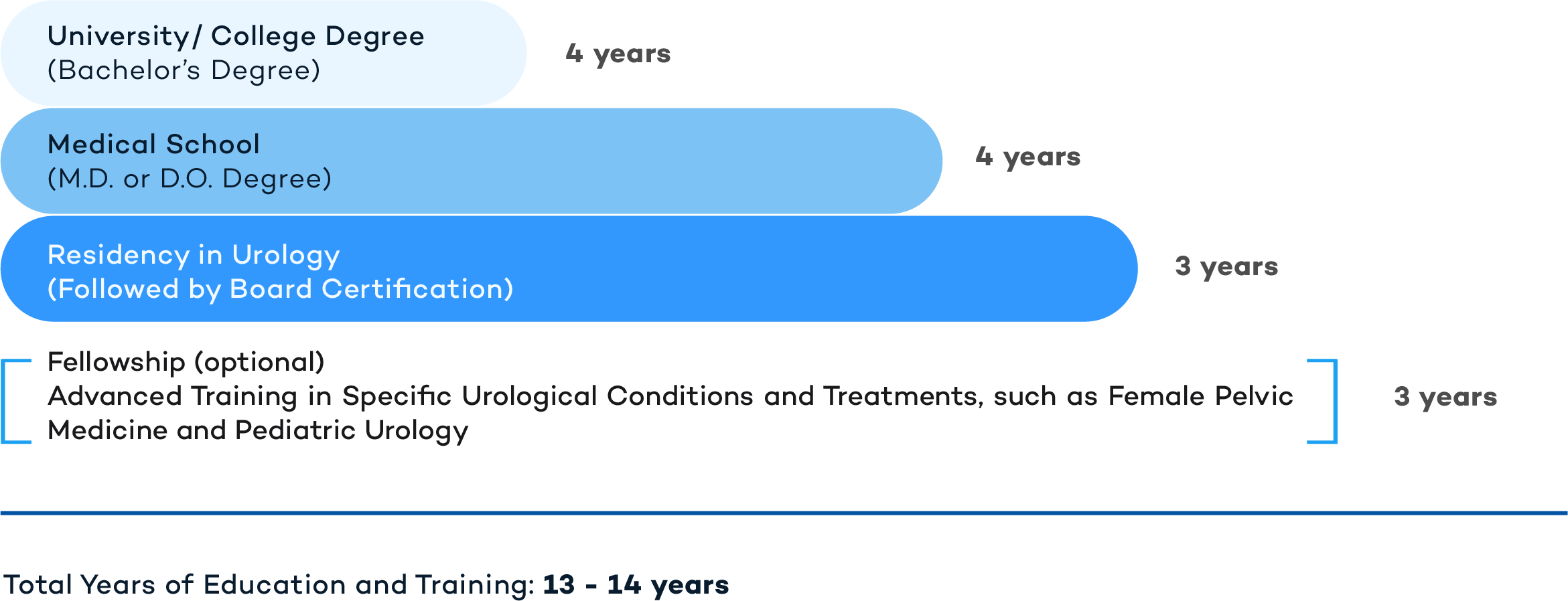

A Urologist is a Board-Certified Doctor who treats and diagnoses the medical conditions of the urinary tract of men and women, and the reproductive system of men.
When looking for a Urologist, it is very important that you choose a physician that you feel comfortable with, and are able to easily communicate with. Your primary healthcare physician (Internal Medicine or Family Medicine) can facilitate a referral to a urologist, and you can also do your diligence and check the credentials and practice style of the doctor with the help of your family and friends. At myDoqter, you have access to patients’ feedback about doctors, and you can also see the professional recommendations given by other physicians who have witnessed first-hand the expertise and professional competency of your doctor.
Urologists are doctors (M.D. or D.O.) with advanced medical degrees and training. The following is representative of the years of education and training that your urologist has undergone.

URO from the Greek word ‘Ouron’ for ‘urine’ + LOGY from the Greek word ‘logia’ which means ‘logic’ or ‘the study of’.
The urologist treats an extensive list of urinary tract conditions, including:
Urinary Tract Infection: also known as UTI: Women tend to suffer from this condition more than men. This is an infection in any part of your urinary tract (kidneys, ureters, bladder and/or urethra) associated with symptoms of painful or burning urination, cloudy urine, blood in urine, fever, chills and/or abdominal pain.
Kidney Stones: These are solid sediments of minerals and acid salts that stick together in concentrated urine and form stones. They can be painful when passing through the urinary tract. Symptoms include: flank pain, difficulty urinating, blood in the urine, and sometimes fever and chills.
Enlarged Prostate: Swelling of the Prostate gland, associated with problems with urination, usually difficulty urinating or frequent urination.
Male and Female Incontinence: Loss of bladder control, which means that urine is not held properly in the bladder, and spills out easily. Symptoms include urges to urination, and/or leakage of urine.
Prostatitis: Prostate gland inflammation and/or infection, often associated with painful urination; pain in the lower back, abdomen or pelvic area; fever; and chills.
Erectile Dysfunction: This is the inability to get or maintain an erection that is sufficient for sexual intercourse.
Peyronie’s Disease: This is a condition where scar tissue or plaque forms under the skin of the penis, and is commonly associated with bending of the penis, and painful erections.
Male Infertility: This is the inability of a man to cause pregnancy in a fertile, reproductive-age woman.
Vasectomy: This is a procedure and it is also called medical sterilization. It is a minor surgery to prevent pregnancy by blocking sperm from reaching the semen that is ejaculated from the penis.
Prostate Cancer: Cancer in the prostate (gland) of men, which may be associated with symptoms like pain in the lower pelvis area, frequent or painful urination, and blood in the urine or semen (blood in the sperm).
Kidney Cancer: Cancer of the kidney(s), the organs that filter the blood, and remove toxins and waste products of metabolism. In early stages, kidney cancer is not associated with obvious symptoms. In more advanced stages, kidney cancer may have some of the following symptoms: blood in the urine, flank and lower back pain, feeling a mass or lump on the side or lower back, fever, fatigue, loss of appetite, weakness and anemia.
Bladder Cancer: Cancer of the bladder, the sac or bag-like organ in which the urine is collected, after it was produced in the kidneys. Then, from the bladder, the urine is normally sent to a duct-like structure called urethra, and is eliminated during urination. Symptoms of bladder cancer include: pain on urination, pelvic pain, back pain, blood in the urine and frequent urination, among others.
Ultimately, Prevention is truly the most important approach to maintaining the health of your urinary tract and of the male reproductive system. When you visit your urologist, you will also receive important information regarding how best to prevent urinary tract disease, as well as be able to diagnose early male reproductive problems. Important recommendations will include:
Urologists may offer you a range of treatment choices for your condition, and will work with you to find the best-personalized treatment choice and approach. Make sure to discuss all these options, as well as preventive medicine recommendations with your doctor.
For more information on Urinary Tract Disease and Male Infertility, you can visit the following sites:
https://www.urologyhealth.org/urologic-conditions/what-is-urology
https://www.ama-assn.org/specialty/urology
https://www.auanet.org/about-the-aua/why-urology
https://www.urologyhealth.org/patient-magazine/magazine-archives/2013/winter-2013/when-should-i-see-a-urologist